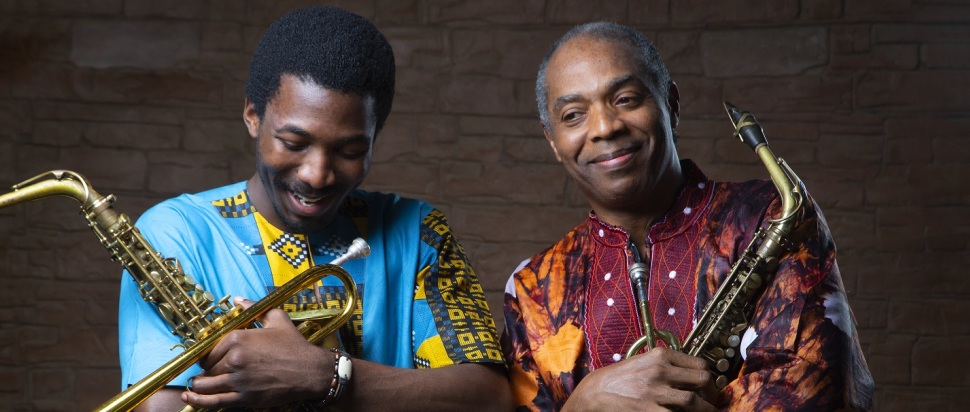Father's Footsteps: Femi & Made Kuti on Legacy+
The father and son discuss their jointly-released solo albums, modern afrobeat, the state of Lagos and the legacy of Fela
“I was very worried. What if I didn’t like what he came out with?”
When Femi Kuti and his son, Made, decided they’d release their latest solo records as part of the same package, they agreed to certain conditions – one being that they wouldn't have any involvement with each other's work. Legacy+ is not a collaborative effort but, as the artwork for each suggests (strikingly similar portraits by Delphine Desane, each presented with a different colour scheme), they represent two sides of the same musical and thematic coin. Femi’s album, Stop the Hate, is his eleventh, using his own jagged take on afrobeat to paint universal portraits of political struggle; Made’s, on the other hand, is his debut at the age of 25, a polished subversion of the genre that crackles with vitality, landing somewhere between modern jazz and funk rock.
Hanging heavy over both is the legacy of the title. The story of Fela Kuti, Femi’s father, the afrobeat groundbreaker and icon of Nigerian resistance politics whose searing lack of regard for convention both musical and social is now – via books, documentaries and the Broadway musical Fela! – the stuff of considerable legend. Both sides of Legacy+ owe their own deep-rooted sonic debts to the genre that Fela pioneered, and they are both as thematically stinging as you’d expect from the descendants of somebody who considered Malcolm X his ideological idol.
They reckon too with Fela’s complex, and deeply different, individual relationships with Femi and Made. The former, his eldest son, has been profoundly affected by his childhood, and not entirely positively. The chaos of his father’s lifestyle guaranteed a turbulent upbringing, from the time Fela married 27 women at the same ceremony to his long-running and vociferous rejection of Nigerian society that resulted, in 1978, in a bloody 1000-soldier raid on the commune he’d founded. He did not initially encourage Femi’s musical aspirations, going as far as to publicly disparage his son’s 1989 debut, No Cause for Alarm?
As Legacy+ makes clear, Femi has taken a different tack in raising Made. On the same Zoom call from different parts of the family compound near Lagos, the pair laugh as the older Kuti points to his head. “I started going grey worrying about Made’s album,” he jokes of For(e)ward, which he was only permitted to hear once it was 90% mixed. “But it just blew me away. It’s out of this world. It would have been impossible for me to make something like that at his age, with the upbringing I had.
"My father took a big risk in having kids, and he was probably too young for it. Stardom made him neglect us. I was in that storm, and I know how it affected me, and I knew that when I had children I would pay more attention – they would come first. I gave Made love, and when he told me he wanted to be a musician, I provided him with the ingredients. But he still had to cook the soup himself.”
Part of that process, for Made, was spending time studying at London’s Trinity Laban Conservatoire, just as his grandfather had in the late 1950s; that he formed friendships there with contemporaries like Femi Koleoso of Ezra Collective and Cassie Kinoshi of SEED Ensemble goes some way to explaining the distinctly progressive, 21st-century feel that characterises For(e)ward, on which he plays every instrument. He was two years old when Fela died in 1997 and, on the surface, he seems a world apart from him – clean-cut and soft-spoken. The album, though, swiftly makes clear that he inherited Fela’s political ferocity, taking aim as it does at Nigeria’s extreme inequality and governmental corruption – something that, as he explores on Different Streets, appears to be worse now than it was in his grandfather’s day.
“Everything that he was singing about in the 70s and 80s, it’s happening now, only tenfold,” Made explains. “I don’t consider myself an activist – I’m just a concerned civilian – but there are so many things wrong with present-day Nigeria and I find that I struggle to talk about them in conversation. Music is my outlet for that; I can pour out all of these emotions, all these feelings of powerlessness, in a way that I can’t outside of it. I don’t think music has to be political; another person might just want to talk about sex and money. And that’s fine! There should always be diversity. But for me, I express myself with the saxophone, and my worldview comes out.”
If there’s a key theme underscoring Legacy+, Made says, it’s continuity – something that the plus of the title is intended to represent. Fela’s influence looms large, and Femi reveals that the albums would have been released on his father’s birthday were it not for the pandemic, but the key takeaway from them is that both Femi and Made are their own musicians and their own men – just ones with a remarkably strong strand of artistic and political DNA running through them.
“For me, that’s down to afrobeat as a genre,” Made reflects. “It’s been passed down through generations in general; the instrumental interplay, the number of rhythms, and the groove are all fundamental elements in what makes R&B work today. You can hear that very clearly on both sides of the album, so Fela’s presence is there, but I think my father and I come across as our own people, from different universes of the same kind of sound. As a family, we’re still pushing all the boundaries we can.”
Legacy+ is available now via Partisan Records
